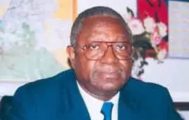Categories
Recent Posts
- Football: Gabon forward Boupendza dies aged 28 in China
- Cameroonian youth urged to embrace hope despite multiple challenges
- Bishop of Bafoussam calls on voters to ‘make no mistake’ in this year’s election
- World Bank increases funding to Cameroon by 21%
- Ukraine: Trump blames Zelensky for starting war after massive Russian attack
Archives
- April 2025
- March 2025
- February 2025
- January 2025
- December 2024
- November 2024
- October 2024
- September 2024
- August 2024
- July 2024
- June 2024
- May 2024
- April 2024
- March 2024
- February 2024
- January 2024
- December 2023
- November 2023
- October 2023
- September 2023
- August 2023
- July 2023
- June 2023
- May 2023
- April 2023
- March 2023
- February 2023
- January 2023
- December 2022
- November 2022
- October 2022
- September 2022
- August 2022
- July 2022
- June 2022
- May 2022
- April 2022
- March 2022
- February 2022
- January 2022
- December 2021
- November 2021
- October 2021
- September 2021
- August 2021
- July 2021
- June 2021
- May 2021
- April 2021
- March 2021
- February 2021
- January 2021
- December 2020
- November 2020
- October 2020
- September 2020
- August 2020
- July 2020
- June 2020
- May 2020
- April 2020
- March 2020
- February 2020
- January 2020
- December 2019
- November 2019
- October 2019
- September 2019
- August 2019
- July 2019
- June 2019
- May 2019
- April 2019
- March 2019
- February 2019
- January 2019
- December 2018
- November 2018
- October 2018
- September 2018
- August 2018
- July 2018
- June 2018
- May 2018
- April 2018
- March 2018
- February 2018
- January 2018
- December 2017
- November 2017
- October 2017
- September 2017
- August 2017
- July 2017
- June 2017
- May 2017
- April 2017
- March 2017
- February 2017
- January 2017
- December 2016
- November 2016
- October 2016
- September 2016
- August 2016
- July 2016
- June 2016
Featured
 Burkina Faso: Where vision meets discipline
Burkina Faso: Where vision meets discipline  Prosecution of journalists in Cameroon: European Parliament says enough red flags have been ignored
Prosecution of journalists in Cameroon: European Parliament says enough red flags have been ignored  1982-2025: How long will Biya hang on?
1982-2025: How long will Biya hang on?  How Biya and Archbishop Nkea protected the sanctity of the family in Cameroon
How Biya and Archbishop Nkea protected the sanctity of the family in Cameroon  October Presidential Election: Will 92-year-old Biya be re-elected?
October Presidential Election: Will 92-year-old Biya be re-elected?
Most Commented Posts
 4 Anglophone detainees killed in Yaounde
4 Anglophone detainees killed in Yaounde
18 comments Chantal Biya says she will return to Cameroon if General Ivo Yenwo, Martin Belinga Eboutou and Ferdinand Ngoh Ngoh are sacked
Chantal Biya says she will return to Cameroon if General Ivo Yenwo, Martin Belinga Eboutou and Ferdinand Ngoh Ngoh are sacked
13 comments The Anglophone Problem – When Facts don’t Lie
The Anglophone Problem – When Facts don’t Lie
12 comments Anglophone Nationalism: Barrister Eyambe says “hidden plans are at work”
Anglophone Nationalism: Barrister Eyambe says “hidden plans are at work”
12 comments Largest wave of arrest by BIR in Bamenda
Largest wave of arrest by BIR in Bamenda
10 comments
Latest Tweets
Featured
-

Football: Gabon forward Boupendza dies aged 28 in China
-

Cameroonian youth urged to embrace hope despite multiple challenges
-

Bishop of Bafoussam calls on voters to ‘make no mistake’ in this year’s election
-

World Bank increases funding to Cameroon by 21%
-

Ukraine: Trump blames Zelensky for starting war after massive Russian attack
-

Minister Obi Eta Jerome’s death – What do we know?
-

Pope Francis transfers Cameroonian-born Nigerian Apostolic Nuncio in Sri Lanka to Ethiopia
© Cameroon Concord News 2025
21, January 2020
Southern Cameroons Crisis: Senior government official bares his mind 0
by soter • Editorial, Headline News
Radicalized by the government’s use of death squads and arsonists to intimidate Southern Cameroonian fighters, a senior government official on Monday, January 20, 2020, clearly expressed his frustration with the government’s strategy to end the rebellion in the two English-speaking regions of the country.
Speaking to the Cameroon Concord News Group Chairman, Soter Tarh Agbaw-Ebai, over the phone, the senior official who elected anonymity said he was really frustrated with the manner in which the Yaounde government had mismanaged the Southern Cameroons crisis which started as simple protests by teachers, lawyers and students.
He said his anger boiled over because of the speech delivered by the country’s president, Paul Biya, on December 31, 2019, wherein he promised more violence to Southern Cameroonians if the fighters did not down their weapons.
“I am still at a loss for words. After three good years, we still believe that only military violence and atrocities can help restore peace in the two English-speaking regions of the country,” he said.
“We cannot continue treading the same path and be hoping for different results. Let the government understand that it was its violence that caused things to spiral out of control,” he said, adding that “won’t it be wise for the president and his tribesmen who are committing these atrocities to embrace a different approach? Why are they destroying homes and killing the innocent when the fighters live in the jungles?”
“It is too disheartening to see a man many thought he wanted to become a priest conduct such a nasty war against his own people. What type of country is he bequeathing to the next generation? Today, the country is much divided and there are many Anglophones who hold that they are being killed by a Beti death squad set up by Joseph Beti Assomo, the country’s defense minister. Does this create room for national reconciliation and unity, or does it pit Anglophones against Betis?,” he questioned.
“Many Anglophones in Yaoundé are really upset with the war strategy adopted by the government and the bitterness generated by government atrocities will linger for a long time,” he pointed out.
“Only very few Anglophones in Yaoundé are in favour of what is happening in our two English-speaking regions. Many are angry, but cannot talk. Some like the puffy jaw former Prime Minister, Mafany Musonge, are indifferent to the people’s plight because they are enriching themselves as things deteriorate in the two regions of the country. The world is really surprised at such display of greed. How are these people living with themselves?” he quipped.
He also took aim at Anglophones, stressing that the unity that characterized the revolution in the early days could have brought the government to its knees if the Diaspora had not resorted to shooting itself in the foot.
“Those of us who really feel for our people, but cannot talk, were counting on the Diaspora for salvation. We saw the Southern Cameroonian Diaspora as a silent liberating force. The huge amounts that were being raised in the United States and Canada to finance the war effort gave us hope. But our hope was dashed when the leaders started fighting each other and vital resources were allegedly embezzled by some Interim Government officials,” the disappointed official said.
“Many of us were quietly happy when arms started getting to our fighters who before that could only lay their hands on machetes and hunting rifles,” he said.
“If Anglophones have to make more progress, the different factions must stop fighting each other. In moments like this, everybody should be your ally regardless of the individual goal. We know some factions are for independence, others for federalism, while others are gradually settling for autonomy within Cameroon, but regardless of the philosophy of each group, our goal should be to mount pressure on the French-supported government so that it should embrace the Canadian-supported Swiss initiative that is popular with many Western countries,” he stressed.
Once the government buckles under the pressure and decides to embrace the Swiss initiative, then each faction can use the opportunity to present its case. Fighting and killing other fighters only weakens the struggle and the government is watching gleefully as we shoot ourselves in the foot,” the official said.
“We cannot keep on slinging mud at each other. We are splitting our ranks and this is diminishing our capacity to achieve anything meaningful,” he pointed out.
“Mistakes will be made along the way, but instead of focusing on those mistakes, we should be focusing on the solutions and methods that can enable all the factions to work together,” he stressed.
“From every indication, the government is desperate. The crisis has robbed the government of vital revenue streams and this is hurting so badly. The current burning of homes is designed to force the fighters to down their weapons, but from every indication, things will not work the way the government has planned,” he said.
He added that “the burning of homes in villages is not playing in the government’s favor. The Diaspora should use this reckless approach by the government to close ranks. A strong diplomatic initiative should be launched by all the factions and a huge delegation sent to the UN and other organizations to ensure that the Southern Cameroons crisis is not pushed to the back burner,” he stressed.
“Suppress your egos and let unity prevail. As Anglophones, we can achieve a lot if we close ranks, rob ourselves of our egos and consider that the real enemy is the Yaoundé government that is killing our people just for complaining,” he underscored.
“The government is hurting. It is running out of cash. Its coffers are drying up. Those of us within are aware of the state of the country’s finances. If this crisis continues for two more years, the government will shut down many operations. Things are not looking up for this government that thought it could restore order in one week, but it has failed woefully” he said.
He urged Anglophones to contribute money to any faction of their choice, adding that the ultimate goal should the improvement our fate. We have gone through a lot as a minority and if the Diaspora does not bail us out, then we are stuck with a government whose secret agenda is to assimilate us at all cost.
He concluded that he could have loved to express his views openly, but said it would be like committing suicide.
“This government is devilish. It never hesitates to kill those who challenge it. If Wirba had stayed in Cameroon, he would have been history today. He was smart to have left,” he pointed out.
The burning of homes cannot be part of the special status the fake major national dialogue came up with, he said.
“This government cannot be trusted. We must fight to attain our goals. There is no turning back. This government says one thing and does the opposite. Does special status mean burning homes and killing innocent people?” he questioned.
Since the conflict started in 2016, some 5,000 civilians have lost their lives, while sources close to the ministry of defense say some 2,018 soldiers have died and this figure does not include police officers and prison guards who have also been attacked by Southern Cameroonian fighters.
By Kingsley Betek in Yaounde and Soter Tarh Agbaw-Ebai in the United kingdom